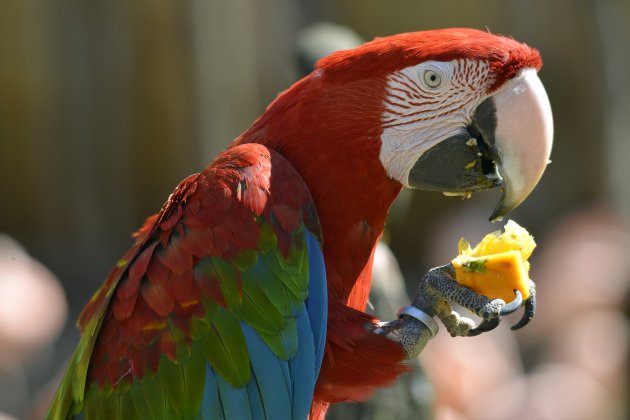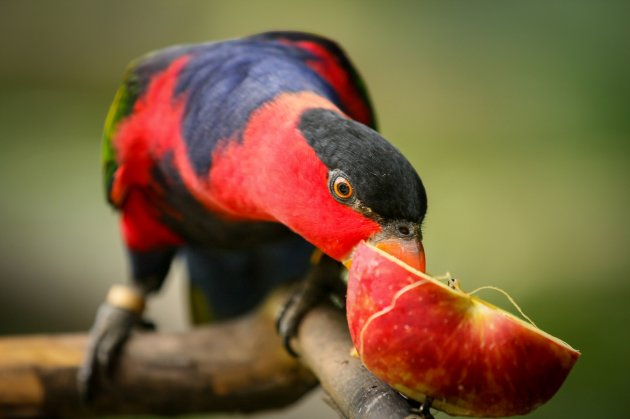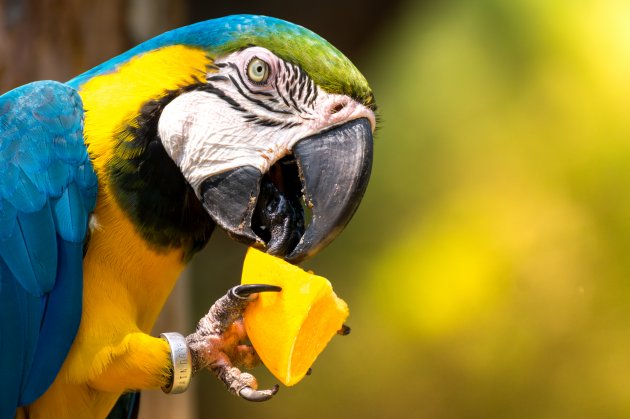Pretty much like with humans, healthy and balanced nutrition is a fundamental factor for our parrot's life. This will make a difference in their life’s quality. How good their diet is will be reflected in their plumage, vitality, and character; it will also affect their susceptibility to diseases and their ability to adapt to climate changes.
Fruits and vegetables play a very important role in providing the right nutrition. Because, contrary to popular belief, parrots cannot live on seeds alone; or at least they will not be healthy at all. Despite this, the parrot’s digestive system does not tolerate the same foods as us; that’s why here at Pet comments, we’ll offer you a list of the best fruits and vegetables you can offer your parrot.

Parrot Approved Fruits!
Fruits are perfect for a diet rich in vitamins for our Parrot. They help them to stay healthy, active, and have a direct influence over their plumage. Of course, it is important to have in mind the nutrients and properties that the fruit has, this will help us determine the number of appropriate rations for your parrot’s species and age.
For example, depending on the level of sugars, we should moderate its consumption. If the fruit has high levels of sugar and we give it frequently or in excess to the parrot, it can cause health diseases such as diabetes mellitus. A disease that affects the pancreas and is common in birds with glucagon excess.
On the other hand, it is appropriate to buy a variety of fruits, to vary their diet and allow them to receive the different vitamins they need. Now, among the fundamental fruits in our parrot's diet, we find:
1. Apple
The apple is a fruit of high nutritional value. Since more than 80% of it is water, it allows our Parrot to stay hydrated. Apples are rich in pectin, a type of soluble fiber that is not absorbed in the intestine. It retains the water and becomes a gel that acts as an emulsion that absorbs waste in the intestine and facilitates the elimination of toxins with the feces, without a doubt a fantastic fruit for our Parrot. However, remember to cleanse the fruit of the stem and seeds, as apple pulp is fantastic for the parrot, but the seeds are toxic to them.
2. Kiwi
This fruit, rich in antioxidants and vitamin C, helps to strengthen the immune system and avoid allergies in our parrots. Yes, the Kiwi raises the defenses, thanks to a large amount of folic acid and vitamin C. Both nutrients produce more red and white blood cells, as well as antibodies, which function as a barrier to viral diseases.
3. Pineapple
The pineapple has a very interesting enzyme called Bromelain, it has been determined that it helps to counteract diseases in the digestive system. But this is not the only property that pineapple offers. It also has vitamin A (which parrots cannot produce on their own), vitamin D3, vitamin C, and folic acid, which is the perfect combo for your parrot to have a bright, shiny plumage and to prevent your parrot from having destructive behaviors to its plumage. It is best if you give it to your parrot with moderation as it irritates the digestive system.
4. Blueberry
One of the main advantages of blueberries is that they have non-stick properties: the proanthocyanidins they contain prevent harmful bacteria from sticking to the gastrointestinal walls. They also have antiseptic, astringent and anti-diarrheal properties, making it great for the digestive system and it helps to prevent diabetes.
5. Papaya
Due to the component Carpaine, the papaya is perfect to counteract the parasites that our parrots can have since its main attribute is to prevent and eliminate parasites and intestinal worms. Likewise, it offers incredible benefits for their ocular health; the papaya has a varied content of antioxidants, like the lutein (which birds don’t produce on their own), and thanks to these nutrients it can prevent ocular diseases.
6. Watermelon
92% water, low in sugars and full of vitamins and minerals. The watermelon also has vitamin B6 which allows the parrot to be full of vitality, and the potassium in the watermelon will help the parrot's muscle function and blood pressure regulation and the vitamin C strengthens its immune system. Still, if you want your parrot to benefit fully from the properties of this fruit, remember to remove the shell and seeds from the fruit.
Other equally beneficial fruits can be pears (without seeds and stems), apricots, tangerines, oranges, grapefruits or pomegranates. You can also add banana, melon, grapes, cherries, peach, mango, loquat, but in reduced consumption.

Parrot Approved Vegetables!
These should be the basis of our birds' daily diet. In the past, it was believed and commonly practiced that the basis of the diet for these animals was sunflower seeds. It has been proven that this is a terrible mistake, as these seeds do not provide the necessary nutrients and vitamins, and they even have excess fat.
Therefore, the best option is vegetables, always taking into account the species, age and season. The following vegetables are the most recommended for all parrots:
1. Spinach
Realistically, we won't have a little Popeye parrot, but we will have a rejuvenated Parrot. Spinach has a low amount of fat and hydrate, is rich in fiber and vitamins A, C, E, K and B2, B2, B1 and B9 (folic acid). Among other things, spinach will improve the functioning of your parrot's muscles, give energy and vitality and help prevent diseases. Although it sounds like a nutrient pump, it's best to give it in moderation because it has oxalic acid and that decreases calcium absorption if is given in excess.
2. Chard
Chard contains Lutein, an antioxidant that is not produced by animals, and therefore it is good that they eat it. Besides, the folates it possesses strengthens the immune system. It takes care of the nervous system, muscle health, and helps maintain a good heart rate; its magnesium contribution promotes the health of the digestive system and intestinal transit, as well as bone development. However, it should be given only cooked and rarely.
3. Artichoke
Among its benefits stands out its depurative capacity and the elimination of waste substances in the organism, this makes it a magnificent vegetable for the liver and ideal to eliminate the fats that do so much harm to our animals. Its digestive capacity is undeniable given the fiber it contains, so its consumption provides a feeling of fullness and acts as a mild laxative. It is not recommended that they eat it in excess.
4. Broccoli
Its richness in vitamins C, A, E and K will provide your pet parrot with the benefits of its properties. Vitamin A protects their heart and bones, while vitamin K strengthens their immune system and promotes detoxification of their body. Vitamin C favors cicatrization, and vitamin E affects directly their vision, feathers, and nails. Excess causes diarrhea, vomiting and can affect the thyroid
5. Radishes
An ideal element for the digestive system, it increases the intestinal flora, facilitating better food digestion. Radishes stand out for their high concentration of vitamin C, which is a good antioxidant. It supplies parrots with calcium and potassium, ideal for the central nervous system, iodine, and magnesium in good proportions, as well as sulfur, which is also an antioxidant. In excess, it affects the thyroid.
6. Green pepper
The green pepper has multiple nutrients. Among them are the carotenes, antioxidants, and fiber, which helps the intestinal system of the parrot and promotes good circulation. Besides, they are low in calories, so we do not have to worry about an obese parrot. In addition to these, you can include red and yellow peppers, endive, cauliflower, carrots, beans, and celery.

Fruits or Vegetables You Should Not Give To Your Parrot
It is of utmost importance to keep in mind that avocado, eggplant, and tomato should never be included in the diet of our birds, as they seriously endanger the health of the parrots.
Avocado contains a substance called persin that is generally harmless to humans but can be very toxic and even deadly to our parrot. The danger of persin lies mainly in its capacity to damage the heart muscle and cause cell death. It also produces inflammation in the stomach, intestine and breast tissue.
On the other hand, aubergine can cause poor appetite and diarrhea. Due to its toxic salts, it is harmful to the digestive system of our birds. Although tomato pulp is tasty and healthy for birds, the leaves, stems, and seeds can cause intoxication. Therefore, tomatoes should be carefully cleaned before offering them to your pet.
Conclusion
Dear owner, according to veterinarians, nutritional disorders are the most common health problems in pet parrots. Misinformation results in non-nutritious and harmful diets for parrots. Keep in mind that the needs of each species are different and may vary over the years. On the other hand, remember that a diet based only on commercial preparations can cause deficiencies of minerals, vitamins, and essential amino acids, as well as containing high levels of fat.
Finally, we recommend that in times of molting, supplement their diet with vitamin complexes for parrots.
We hope that this article will help you to provide the right food to your parrot, which will result in a healthy and happy parrot.
References and further reading:
- parrots.org.Parrot Nutrition Guide
- Veterinarian Toronto. Fruits and Vegetables in Bird Diets
- PetMD. 8 Foods That Are Toxic to Birds
- Merck Veterinary Manual.Sharman M. Hoppes. Miscellaneous Diseases of Pet Birds
- Karmen Budai and Shean Pao (May 8, 2018) - A Parrot's Fine Cuisine Cookbook and Nutritional Guide